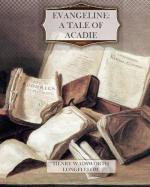NOTE Page 5
Introduction.
The author
7
the poem
9
Acadia and the Acadians
12
Evangeline: A tale of Acadie.
Part the first
20
part the second
60
Notes on Evangeline.
Part one
107
part two
110
A plan of study.
Part I
119
part II
124
part III
142
INTRODUCTION.
THE AUTHOR.
Henry Wadsworth Longfellow was born in Portland, Maine, February 27, 1807. His father and mother were of English stock, his mother being a descendant of “John Alden and Priscilla.” Stephen Longfellow, his father, was a lawyer and statesman. Henry’s school life began at the age of three. When he was six years old he could read, spell and multiply, and at the age of seven was half way through his Latin grammar. He early showed a taste for reading, and read not only his father’s small stock of books, but frequented the Portland Library and book stores. “The Battle of Lovell’s Pond” was his first poem, written when he was thirteen. He entered Bowdoin College at the age of fourteen, graduating in 1825. During the latter part of his student life there he began to show a considerable literary bent. Shortly after graduating from Bowdoin, Longfellow was elected Professor of Modern Languages in that institution. Before entering upon his work, he spent three years in study and travel in Europe, returning to America in 1829. For five and one-half years he taught in Bowdoin, during which time he began serious work as an author. In 1834, Harvard called him to the chair of Modern Languages. He again made a trip to Europe for further study. Longfellow was connected with Harvard for nineteen years, resigning his position in 1854 to devote his whole time to literature.
His two principal prose works are “Outre Mer” and “Hyperion.” The latter was followed by a volume of poems entitled “Voices of the Night.” “Ballads and Other Poems” appeared in 1841, and showed much more talent. “Evangeline” was written in 1847; “Hiawatha” in 1855, and the “Courtship of Miles Standish” in 1857. “Evangeline” and “Hiawatha” are considered the best of his longer poems. “The Building of the Ship” and “Excelsior” are perhaps the best known of his shorter poems.
Longfellow died at Cambridge in 1882.
THE POEM.
“Evangeline” is considered Longfellow’s masterpiece among his longer poems. It is said to have been the author’s favorite. It has a universal popularity, having been translated into many languages.




